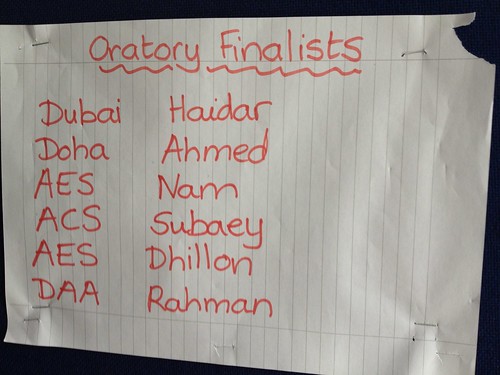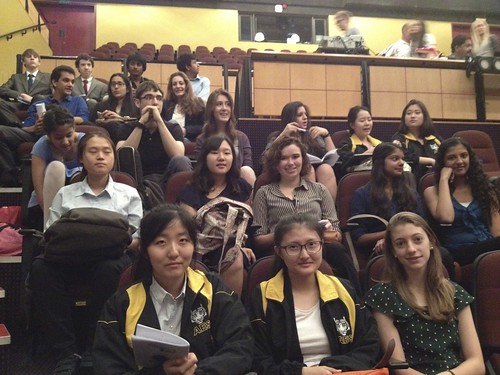Forensics – Not just for dead people.
That’s the slogan on the back of our team T-shirts.
As one of the MESAC Forensics Team coaches, I heard a lot of surprised exclamations such as, “Wow! You guys do forensics? I didn’t know you were trained in that!” Sigh … It’s not “forensic science” à la CSI. It’s forensics à la Socrates. In other words, the students compete in debate, public speaking and dramatic interpretation of monologues or duet scenes.
According to the American Forensic Association,
“Forensics” is a word rooted in the Western world’s classical experience. The Greeks organized contests for speakers that developed and recognized the abilities their society felt central to democracy. These exercises acquired the title “forensics,” derived from the Latin term “forensis” and closely related to forum. Because the training in this skill of public advocacy, including the development of evidence, found one of its important venues in the law courts, the term “forensic” has also become associated with the art and science of legal evidence and argument.
Our school is a member of MESAC (Middle East South Asia Conference), which also includes schools from Oman, the United Arab Emirates and Qatar. As one of four American Embassy School coaches (a fifth stayed behind in India), I traveled with 20 amazing high-schoolers to represent AES at the 2013 MESAC Forensics Tournament, April 17-21 in Muscat, Oman.
The American-British Academy (ABA) played host.

Our fledgling forensics program fielded a debate team for the first time, and this was only the second year we participated in acting and speaking events. Nevertheless:
* Two of the debaters beat last year’s winners to earn a bronze medal.
* We sent 12 students to the finals.
* Seven kids came home with medals.
* AES placed second overall.
This is what we liked to see! Lots of “AES” on the results posters.

We adults felt excited for the medalists, but our greatest fulfillment came from watching the growth that occurred over the course of our season. This is a unique team in that students have an opportunity to express themselves in ways that take them far out of their comfort zone. For the oratory event, they wrote, memorized and presented powerful speeches calling for action. Our students addressed mental health in children, women’s rights in India, care of HIV/AIDS patients, Asian stereotypes and parental pressure for perfection. They spoke from the heart, revealing their deepest fears and biggest aspirations.
We may have seen the greatest transformation in our students competing in oral interpretation. They chose challenging pieces of literature to read, and some of the English learners required line-by-line explanations of the meaning before they could start interpreting. They worked so hard, begging for extra coaching time, meeting on weekends, shedding their inhibitions. When one of our 10th-graders took the stage to read “The Orange” by Joyce Carol Oates, she gave it everything she had, leaving the audience disarmed but in awe. Our only senior had brilliantly edited down a scene from “‘Night, Mother” and read the lines for both characters. Her subtle sophisticated performance tricked my mind into thinking there really were two people on stage and her last line forced a catch in my throat as I fought back tears.
There were so many success stories … not a slacker in the bunch. In addition to their work, our kids were kind, friendly and outgoing. They bonded with students from other schools and demonstrated admirable sportsmanship. So proud of them all! I feel incredibly fortunate to work at a school with this caliber of young people.
First day of the tournament at ABA … waiting in the auditorium.

My good friend Jacqueline, who taught with us in Turkey, now works at The American International School of Muscat. I was hoping to meet up with her during our visit, but the tournament schedule was grueling. Imagine my excitement when she showed up at the ABA coaches lounge! She hung out with us at the school a few times and then surprised me with a ticket to see “Madame Butterfly” at the Royal Opera House. I almost declined, exhausted from a lingering cold and the intensity of the tournament, but I couldn’t resist the lure of a cultural event paired with some Jacq time. The two-year-old Opera House was stunning inside and out. In fact, I may have appreciated the venue even more than the show!

Jacqueline and me. (I’m the one who looks less like a posh opera-goer and more like a worn-out teacher at the end of a long day.)

Here’s a cool promotional video from the Royal Opera House website:
Our only other foray into Muscat was a traffic-y bus ride with all the kids and coaches to a souk, a fun market with Omani souvenirs and crafts. We spent about 30 minutes poking around before heading back to our hotel. Students stayed with ABA families, so coaches enjoyed a little downtime. In fact, one of the other coaches had issued a challenge: Which coach could find the best souvenir for one riyal (about $3)? Back at the hotel, the coaches met to compare souvenirs. The AES coaches nailed it. We had purchased a bizarre plastic pull-string toy featuring a Barbie-ish doll riding a sort of bicycle rickshaw with a green alien-ish baby and a rotating umbrella. We turned it into a trophy and gave it temporarily to our MVP. (I’ll post a photo when we get it back.)


